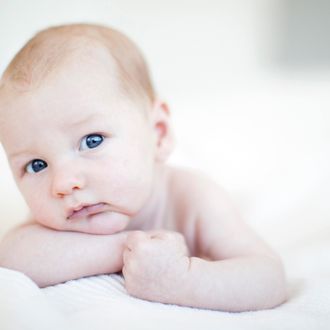
Among the most striking findings social science has offered us in the last half century — and it’s a finding that’s resurfaced in a variety of disciplines and contexts — is that parents are no happier than non-parents, and in a number of instances are considerably less so.
Anyone with children looks twice at this peculiar data. Indeed, it seems to cry out for interrogation — which is why I wrote a story about this very subject three summers ago for this magazine. Yes, kids are challenging and exhausting, but the fulfillments they bring also have no equal, at least for many of us.
It should come as no surprise, then, that when a paper called In Defense of Parenthood: Children Are Associated With More Joy Than Misery [pdf] appeared earlier this year, it received a lot of attention. Time, USA Today, and the Atlantic ran pieces about it; so did NPR and the Today show. Just last week, one of the authors, UC Riverside’s highly respected Sonja Lyubomirsky, wrote yet another essay for Time citing her research.
But there is now new reason to question those findings. The very journal that published Lyubomirsky’s paper, Psychological Science, has accepted another that offers a sharp critique of it — which in fact reanalyzes the same data and yields a very different result. (The paper should be published sometime this fall.) The authors’ conclusions, effectively, is that parenthood doesn’t make us any happier.
Lyubomirsky and her co-authors will have a chance to respond, of course. But from the get-go, their paper seemed a little strange. It was, for starters, internally self-contradicting: Though it claimed “overall, parents report being happier, more satisfied, and thinking more about meaning than non-parents,” it said on the same page that this effect was true “only among fathers.” (USA Today, to its credit, figured this out, and so did Jezebel, whose headline was: “Parenting Makes Dads Happy, Moms Not So Much.”) In one of the study’s samples, the mean age of the participants was 57, meaning that half of the parents in their survey likely didn’t even have kids living at home anymore.
But perhaps the most peculiar part of the original paper was that it didn’t control for the basic variables that most social science experiments do: age, income and marital status. (The paper does indeed talk about these variables, but it doesn’t control for them.) That’s what the authors of this new paper do: control for these crucial factors. And once they did, the happiness boost supplied by children disappeared — for fathers too.
Of course, this doesn’t mean that children don’t bring parents happiness. Or that they do not, indeed, make their parents happier. It’s an extremely tricky business, measuring our well-being. This idea that children have little empirical impact on our happiness (or go so far as to compromise it) has always struck me as both eerily right and horribly wrong. On one hand, it exposes how we experience child rearing today, with parents pitching frenetically from pillar to post on their kids’ behalves; but it also reveals the limits of the studies themselves, which seemed for whatever reason not to capture the more transcendent moments in parenting, or that sense of purpose and perpetual-forward motion that kids can uniquely create.
The metrics and methods that social scientists use in studying happiness are still shifting, still being refined. The trio that wrote this rebuttal in Psychological Science — economist Saurabh Bhargava, psychologist Karim S. Kassam, and renowned economist and psychologist George Loewenstein — are in fact working on a paper at this very moment that suggests parents of girls (though not boys) are happier than those without children (which will be interesting to read when juxtaposed against other research that says parents of girls are more likely to divorce.) A couple of years ago, the economists Andrew Oswald and David Blanchflower looked at a 2009 sample of over 300,000 people and found that the effect of children on our overall well-being was essentially zero.
Ultimately, the headlines from these studies, the do-they-or-don’t-they-improve-our-lives questions these papers address, mean little on their own. What matters is how children reshape the contours of our lives — and those answers are never straightforward. They are glorious and agonizing and vexingly complex. As kids are. As life is. What’s interesting, in a way, isn’t that these studies sometimes contradict one another, telling us kids improve our lives at one turn and compromise them the next. What’s interesting is that our appetite for them, as parents, never ends. We feel the need to hear both.





























